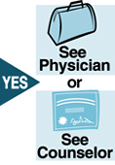Posttraumatic Stress DisorderPosttraumatic stress disorder (PTSD) affects people who have survived any type of trauma, such as that which occurs with:
Posttraumatic stress disorder is sometimes called “shell shock” or “battle fatigue” because soldiers who were involved in heavy combat are likely victims of this condition. It affects 35% of trauma victims and women are two times more likely to suffer from it than men. |
 |
Symptoms
The symptoms of PTSD surface after the event has ended, sometimes as long as several years later. A person suffering from PTSD often experiences the following:
|
|
Flashback - Reliving the
event with all its painful memories and emotions. When this occurs,
the person’s attention is completely diverted from the present
reality and their surroundings. |
|
|
“Unreal” Reality - A
state of mind like sleepwalking in which the person behaves as if
they are actually experiencing the event again. The person is not
completely aware of what he is doing. It is like he is in a dream
state. (He may, though, be aware of this state.) For example: A war
veteran who hears a jackhammer pounding pavement may think he is
“under enemy fire.” He becomes fearful, trying to find somewhere to
hide. |
|
|
Nightmares - Reliving
the traumatic experience in one’s sleep, usually waking up in a
terrified state screaming. |
|
|
Insomnia - Becoming
afraid to go to sleep if he has nightmares. |
|
|
Sudden Outbursts of Emotion
- Having repeated outbursts of emotions through tears, anger,
violent outbursts, extreme fear and/or panic attacks. |
|
|
Detachment from Others -
Shying away from close emotional relationships with friends, family
and/or co-workers. This usually follows a period in which the victim
feels emotionally “numb” with few emotional responses and is only
able to do routine, mechanical things. |
|
|
Guilt - Experiencing
guilt if friends or family did not make it through the event. This
is often called “Survivors Guilt.” |
|
|
Avoids Situations -
Avoiding situations that remind them of the traumatic event. For
example, a rape victim will avoid sexual contact with a partner, a
riot victim may avoid noisy crowds. |
|
|
Abuses Alcohol/Drugs -
Using alcohol and/or drugs to block out their emotions and help them
forget the pain of the experience. |
|
|
Avoids Responsibility -
Persons with PTSD, especially those who have witnessed the loss of
human life, may feel they failed to protect someone from being
killed. As a result, they may experience trouble on their jobs and
trouble expressing loving emotions to friends and family. |
|
|
Poor Concentration -
Trouble remembering recent events or staying focused in thought. |
|
|
Depression - Finding it difficult to work out their guilt and grief resulting from the loss of loved ones and/or loss of security. They may also be unable to feel like they are “back in the real world.” |
Treatment
Posttraumatic stress disorder, in most cases, should be treated by a mental health professional, i.e., a psychiatrist, psychologist, social worker or counselor. Treatment can usually be done on an outpatient basis. However, if you have become a threat to yourself or others, you may need to be hospitalized for treatment. Treatment will help you:
|
|
Discuss the event and the pain it has caused you |
|
|
Resolve your feelings of grief which you may find hard to express |
Types of Post-Traumatic Stress Disorder Therapies
|
|
Individual Therapy - This allows you
to look at the things you value in life and how your behavior and
experience during the event(s) may have violated or upset your
values. You will work on:
|
|
|
Family Therapy - Your partner,
children, siblings and/or parents may need to be included in your
therapy because of your behavior toward them. This helps:
|
|
|
Self-Help or Peer Counseling Groups -
You may join “survivor’s” groups who share their experiences and
reactions with each other. This helps to show that:
|
|
|
Eye Movement Desensitization and Reprocessing (EMDR). |
|
|
Medication, such as anti-anxiety drugs, may be used in conjunction with the above therapies. |
Questions to Ask
|
 |
|
|
|
|
 |
|
|
|
|
 |
|
|
|
|
 |
|
|
|
|